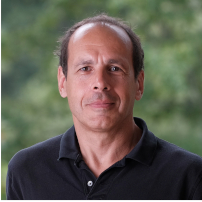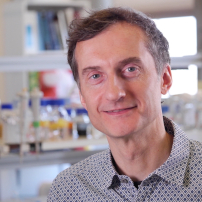Scientific breakthrough using Zebrafish as model organism
The above listed researchers have consistently made pioneering research and made scientific breakthroughs using Zebrafish (Danio rerio) as vertebrate model organism.
Lessons from Zebrafish: Transcriptional adaptation - a mechanism underlying genetic robustness

Didier Stainier
Prof. Stainier is Belgian/American developmental geneticist. He did his Ph.D in Biochemistry and Molecular Biology at Harvard University (1990) working on mice neurodevelopement with Prof. Walter Gilbert. He switched to zebrafish cardiac development during his Postdoc at Massachusetts General Hospital (Boston) with Prof. Mark Fishman. He was a group leader in University of California San Francisco (UCSF) from 1995-2011 and was awarded Professorship in 2003. In 2012, he moved to Max Planck Institute for Heart and Lung Research, Germany and is currently a group leader and director of the Institute. Prof. Stainier’s works include several pioneering research on organogenesis including cell differentiation, tissue morphogenesis, organ homeostasis and function, as well as organ regeneration. His group applies forward and reverse genetic approaches to dissect cellular processes using high-resolution live imaging and at single-cell level.
Lessons from Zebrafish: Mechanisms underlying tuberculosis resistance and nerve-damage in leprosy

Lalita Ramakrishnan
Prof. Ramakrishnan is Indian-origin American microbiologist. She did her Ph.D on immunology in Tufts University (1990) with Prof. Naomi Rosenberg. She switched to zebrafish at Prof. Stanley Falkow's lab at Stanford University, where she developed the strategy of using Mycobacterium marinum infection in zebrafish as a model for tuberculosis. She was a group leader in University of Washington from 2001-2013. In 2014, she moved to University of Cambridge, United Kingdom. Prof. Ramakrishnan’s studies the pathogenesis of tuberculosis (TB) and the basis of vastly different susceptibilities to this disease. Her group applies forward and reverse genetics to understand the basis of host resistance and susceptibility to TB. She is also studying the mechanisms underlying nerve damage in leprosy.
Cellular Biographies: insights from zebrafish.

Alexander Schier
Prof. Schier is Swiss/American developmental and cell biologist. He did his Ph.D in Cell Biology at Univ. of Basel (1992) working on gene regulation in Drosophila with Prof. Walter J. Gehring. He switched to zebrafish and performed forward genetic screens during his Postdoc at Massachusetts General Hospital (Boston) with Prof. Wolfgang Driever. He was a group leader in Skirball Institute, NYU School of Medicine between 1996-2004. And from 2005 to 2019, he was Professor at Dept. of Mol. & Cell Biology, Harvard University. In 2018, he moved to Univ. of Basel, Switzerland and is currently the group leader and Director of the Biozentrum.